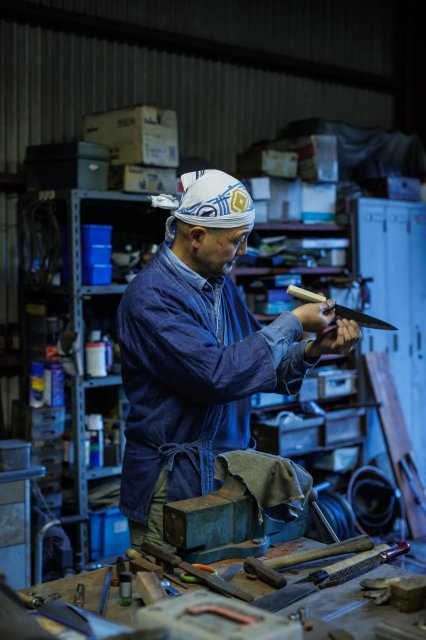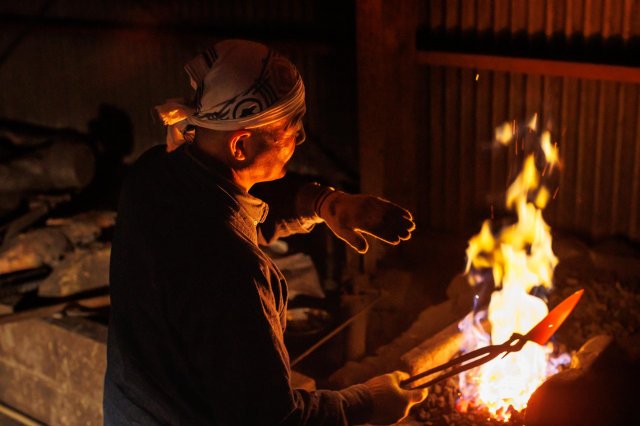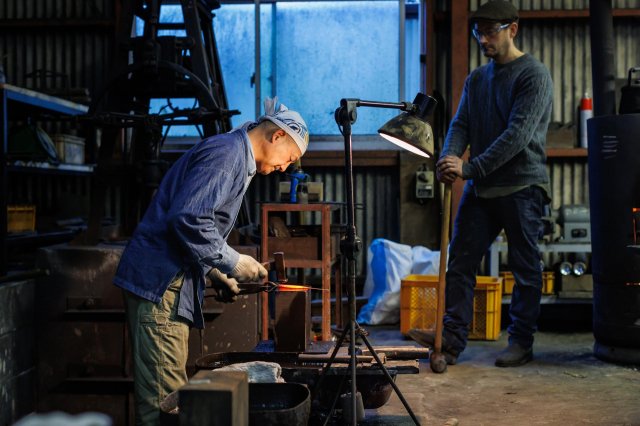- 2023.01.29
-
We are Kochi-ke: Nobuya Hayashi
A timeless knife forged with heart
“Every knife gets an A+ as soon as it’s finished. But interestingly, the next day, I start noticing flaws in its construction. The more time passes, the more insufficiencies I see in my technique, and the initial A+ knife soon turns into an average C in my eyes. Even after 10 years of training under my late master and another decade running this workshop mostly on my own, I’m still learning. But that relentless opportunity for growth is what keeps things so fun. Thankfully, I’ve arrived at a point in my learning where I now know how to fix my flaws for next time. Whether or not I succeed…whether or not I will ever forge a knife that remains A+ in my eyes for longer than several days is another story. But it’s the strive for any sliver of progress – doesn’t have to be perfection – that keeps me excited to always try again.”
“From physical strength while working the resilient steel, to extreme dexterity when polishing and fine-tuning the knife, the work of a blacksmith requires diverse skills. However, there is a common element in every process, which I think is the most difficult to master. And that has to do with intuition. Meaning, remembering by body, and not by mind.”
“As an example, there is a process called yaki-ire where we harden the knife through intense heating and immediate cooling. As I expose the knife to a blazing fire, I have to monitor the temperature of the metal with my eyes, based on the exact hue of its lava-red color. The timing and duration with which I immediately cool the heated knife in water also has to be exact – not a second shorter or longer – otherwise, it can split in two. This process still makes me nervous because there’s no room for error, but it’s arguably the most important.”
“Within the context of forging Japanese katana (swords), this step is traditionally described as “giving the blade a soul.” Just like that, whether you’re specialized in crafting Japanese kitchen knives and smaller bladed tools like me, or katana swords (which today, requires a special permit through rigorous training), the centuries-long history of forging in Japan – at its very core – comes down to training and trusting a feeling that relies less on logic, and more on heart.”
“Here, among the deep Kochi mountains, I practice an ancient forging technique that dates back over 1500 years. Just like blacksmiths did back then, I start from zero – by collecting the raw material called satetsu (iron sand), which naturally occurs around areas like Kanegahama Beach in Shimanto City.”
“Most things in our world today are partially processed by someone else, making life more convenient. In the same way, it would be easier if I bought ready-made steel rather than make my own, but of course, that wouldn’t be faithful to the traditional technique, and the end product wouldn’t be purely original. At Workshop Kurogane, I focus on crafting one-of-a-kind knives that reflect my unique strengths and weaknesses, as well as the bold beauty of Kochi’s countryside that can’t be found anywhere else. In life, even if it takes a whole lot of failure and feeling lost at times, I believe there’s real meaning in doing something only you can do.”
“One of my other favorite aspects about my work is assisting others on their own journey to forge a knife only they can make. I’ve been so blessed to welcome people from all over the world at my humble workshop, and not only create an original knife together from scratch, but also, exchange unique cultural values and perspectives.”
“I’m honored to offer a place where people who otherwise would never meet can come together surrounded by the simple and serene Japanese countryside to make something beautiful, and tune into their hearts. I dream that your pure Tamahagane (traditional Japanese steel) knife – with its characteristic slow-rusting, complex shimmer – will be a keepsake of your adventure here for as long as time.”
“We are Kochi-ke (Kochi family)” is all about highlighting the stories of the people who make us proud to call Kochi our home. Whether you are living in Kochi now or have only visited once, you are part of the Kochi family
Workshop Kurogane (@たたら製鉄古式鍛造工房くろがね workshop Kurogane) is located right along the majestic Shimanto River, about 2.5 hours from Kochi City by car. If you can't make it to Kochi for an in-person workshop, you can order custom knives online (domestic and international shipping available)
Official website: http://ww8.tiki.ne.jp/~kurogane/newpage10.html
Learn more about the Shimanto River: https://visitkochijapan.com/en/highlights/shimantoriver
“Every knife gets an A+ as soon as it’s finished. But interestingly, the next day, I start noticing flaws in its construction. The more time passes, the more insufficiencies I see in my technique, and the initial A+ knife soon turns into an average C in my eyes. Even after 10 years of training under my late master and another decade running this workshop mostly on my own, I’m still learning. But that relentless opportunity for growth is what keeps things so fun. Thankfully, I’ve arrived at a point in my learning where I now know how to fix my flaws for next time. Whether or not I succeed…whether or not I will ever forge a knife that remains A+ in my eyes for longer than several days is another story. But it’s the strive for any sliver of progress – doesn’t have to be perfection – that keeps me excited to always try again.”
“From physical strength while working the resilient steel, to extreme dexterity when polishing and fine-tuning the knife, the work of a blacksmith requires diverse skills. However, there is a common element in every process, which I think is the most difficult to master. And that has to do with intuition. Meaning, remembering by body, and not by mind.”
“As an example, there is a process called yaki-ire where we harden the knife through intense heating and immediate cooling. As I expose the knife to a blazing fire, I have to monitor the temperature of the metal with my eyes, based on the exact hue of its lava-red color. The timing and duration with which I immediately cool the heated knife in water also has to be exact – not a second shorter or longer – otherwise, it can split in two. This process still makes me nervous because there’s no room for error, but it’s arguably the most important.”
“Within the context of forging Japanese katana (swords), this step is traditionally described as “giving the blade a soul.” Just like that, whether you’re specialized in crafting Japanese kitchen knives and smaller bladed tools like me, or katana swords (which today, requires a special permit through rigorous training), the centuries-long history of forging in Japan – at its very core – comes down to training and trusting a feeling that relies less on logic, and more on heart.”
“Here, among the deep Kochi mountains, I practice an ancient forging technique that dates back over 1500 years. Just like blacksmiths did back then, I start from zero – by collecting the raw material called satetsu (iron sand), which naturally occurs around areas like Kanegahama Beach in Shimanto City.”
“Most things in our world today are partially processed by someone else, making life more convenient. In the same way, it would be easier if I bought ready-made steel rather than make my own, but of course, that wouldn’t be faithful to the traditional technique, and the end product wouldn’t be purely original. At Workshop Kurogane, I focus on crafting one-of-a-kind knives that reflect my unique strengths and weaknesses, as well as the bold beauty of Kochi’s countryside that can’t be found anywhere else. In life, even if it takes a whole lot of failure and feeling lost at times, I believe there’s real meaning in doing something only you can do.”
“One of my other favorite aspects about my work is assisting others on their own journey to forge a knife only they can make. I’ve been so blessed to welcome people from all over the world at my humble workshop, and not only create an original knife together from scratch, but also, exchange unique cultural values and perspectives.”
“I’m honored to offer a place where people who otherwise would never meet can come together surrounded by the simple and serene Japanese countryside to make something beautiful, and tune into their hearts. I dream that your pure Tamahagane (traditional Japanese steel) knife – with its characteristic slow-rusting, complex shimmer – will be a keepsake of your adventure here for as long as time.”
“We are Kochi-ke (Kochi family)” is all about highlighting the stories of the people who make us proud to call Kochi our home. Whether you are living in Kochi now or have only visited once, you are part of the Kochi family
Workshop Kurogane (@たたら製鉄古式鍛造工房くろがね workshop Kurogane) is located right along the majestic Shimanto River, about 2.5 hours from Kochi City by car. If you can't make it to Kochi for an in-person workshop, you can order custom knives online (domestic and international shipping available)
Official website: http://ww8.tiki.ne.jp/~kurogane/newpage10.html
Learn more about the Shimanto River: https://visitkochijapan.com/en/highlights/shimantoriver


